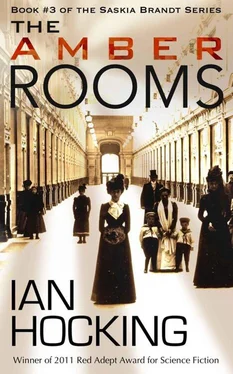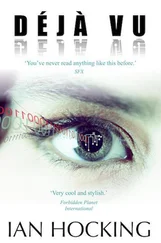Saskia reached across the bed and embraced him. His frame felt lanky and weak. Pasha wept on her shoulder and Saskia cried, too, remembering the bloody tears that she had once shed. She pushed his cheek against hers and felt the warmth of his neck. She could not avoid the dark thought that within him, inside that warm blood, was the i-Core.
He sees the technology as dogs , Saskia thought. Can he infect other animals? Could he see through the eyes of a dog as it locks its jaw around the neck of a man? Is that my gift?
‘Come with me,’ said Pasha, when his breathing had slowed. Saskia relaxed her grip but Pasha still held tight. ‘I’m going on a Grand Tour. It was my idea and Mother agrees.’
‘What about your position at the Lyceum?’
‘Mathematics no longer interests me.’ His voice had grown younger. ‘I want to know about science.’
Saskia looked at the suitcases behind his bed.
‘You’re taking most of the house with you.’
‘Only the essentials.’
Saskia, still holding him, looked once more at the black handkerchief around her amputation. She understood that accompanying Pasha would be a great risk for him. Yet there was a youthful power in his body, and it spoke to her.
‘I cannot come with you,’ she said. At his disappointed sigh, she continued, ‘At least, not as you know me.’
‘I don’t understand.’
They were looking at one another now.
‘I am going away,’ she said, ‘but not in the manner you think. Do you remember when you were shot in the abdomen?’
‘Yes,’ said Pasha, fiercely. ‘They told me there had been no wound and that the blood belonged to a revolutionary, but I know this is nonsense.’
‘The way in which your wound disappeared is the way in which I am about to change.’
‘You’re talking about the person inside you,’ said Pasha. ‘It relates to what Dr Freud says about the unconscious, does it not?’
Saskia nodded. ‘In a way. And it reminds me of the ship of Theseus. Do you know the conundrum?’
‘Yes, it is told by Plutarch.’
‘Then tell me now.’
‘There was a ship that was preserved by Greeks. In preserving it, they replaced all the oars, and all the planks, and everything that rotted over the years, until it was no longer the ship of Theseus.’
‘And yet it remained the ship of Theseus,’ said Saskia. ‘Just as you remain Pavel Eduardovitch, even though the years pass and the atoms that made you are replaced by new ones.’
‘What will happen to you?’
‘I don’t know. I will sleep, and when I wake up, my name will be Ute. I will speak only German.’
‘I don’t care,’ said Pasha. ‘I speak German very well.’
‘Good. My name, then, will be Ute, and I will remember you only as someone dreamed. I will recognise you, I’m sure, but our friendship will need to begin again. I might look different.’
‘How?’
Saskia thought of the night she woke in the Swiss barn, not long after the Georgian Papashvily had tried to kill her. Her left hand had been quickening.
‘People who recognise me now will recognise me no longer.’
Pasha’s expression was one of delight and puzzlement. ‘How do you know all this?’
‘I can’t be sure. But the sparrows have spoken to me in my dreams, just as the dogs speak to you in yours.’
‘Will the transformation happen quickly?’
‘As soon as I will it.’
Pasha took Saskia’s head in her hands. He moved to kiss her, and she worried about spoiling the moment with a rejection of his advance, but his lips did not touch hers. Instead, he kissed her forehead.
‘You’re my friend,’ he said. ‘We will leave tomorrow for one of our Crimean estates. I insist: I use the imperative tense.’
‘Mood.’
‘Do you agree?’
‘I agree,’ she said. His joy concerned her, but warmed her, too.
‘Will it be like dying?’
‘Yes,’ she said. ‘I think it will.’
~
Later that night, in her room at the hotel, Saskia sang herself a nursery rhyme:
‘Sleep-sleep-sleep . Don’t lie on the edge of the bed or a grey wolf will come and bite you.’
~
Saskia opened her eyes on the dream world. Its simple shore was gone, replaced by a range of black cliffs against which slammed grey waves higher than the tallest building in St Petersburg. On those cliffs stood a castle of ice. From Saskia’s perspective halfway up a staircase cut in the cliff, the walls of the ice castle reached more than one hundred feet above the rock. She gasped as a wave hammered into the gully below her. The shock of the noise made her stumble against the cliff. Then the water fell down and it was all she could do to breathe and ride out the sudden cold.
She took the steps one at a time. They zigzagged up the sheer cliff without a hand-rail or any barrier to the heights. She reached the top of the cliff and, breathing hard, touched the wall of the ice castle. It looked like dirty blue marble, yellowing at the base where the salt water had piled against it over the years. She could not enter the castle here. Instead, she would need to cross an ice bridge. The bridge looked like the one that the smuggler Yacov Emmanuilovich had used to help her cross the border. It was wide enough for a cart and had trellised ice rails.
Ute was standing on the far side of the bridge. Behind her was the dark mouth of the portcullis. As always, this was the person Saskia saw in mirrors: A self-possessed, beautiful and sad woman aged about thirty. She was wearing a black leather jacket, jeans, and black trainers. Her rucksack was slung over one shoulder and her left hand—whole, fingers drumming—was hooked under the strap by a thumb. Her sad expression became watchful when she caught sight of Saskia.
What does she see when she looks at me? thought Saskia. A witch? A gathering of sparrows in the form of a woman?
Saskia stepped onto the bridge. It was firm underfoot. She made sure to keep to the centre. A fall to the dark waters below would be a long one. She stopped on the shallow apex as the uncountable mountains of water spent themselves on the rocks below.
Ute approached Saskia and stopped, too. She seemed taller than usual. Ute’s hopeful expression changed to puzzlement.
‘Where is Saskia?’ Ute asked.
‘I don’t understand. I’m here.’
Ute’s voice held no challenge, only wonder. ‘Saskia? But you are not made of sparrows today.’
Saskia frowned. On an intuition, she reached for a lock of her own hair and pulled it before her eyes. It was blonde. She looked at her hands: the fingers were different—pale, smooth—and there was an unfamiliar, fresh scar across her left palm.
‘What do I look like?’ said Saskia.
Ute reached into the pocket of her leather jacket and produced a compact mirror. She passed it to Saskia, who looked into her own eyes for the first time she could remember.
The girl looked no older than the one who had killed Saskia in the parallel Geneva. She had blue eyes, a large forehead, and a freckled button-nose. Twelve years old? Thirteen? Saskia angled the mirror to see a grey hooded top and blue bodywarmer. Then she turned back to her eyes. Those eyes were ringed with fatigue. They looked scared.
The despair seemed to hollow her out. She sobbed, ‘Who am I?’
Ute gave her an affectionate smile, the kind an adult gives to the child who must be brave. She gathered Saskia in an embrace, and Saskia cried against the black leather jacket with shuddered exhales that boomed within her body, still hollowed by that despair, louder than the erupting waves.
‘I don’t know why I see you as a child today,’ said Ute. Her mouth was muffled against Saskia’s crown. ‘Perhaps there is some meaning in it. Like why am I standing on a bridge made of ice? It would be funny if it weren’t so real. Am I meant to cross the bridge? What’s on the other side?’
Читать дальше












